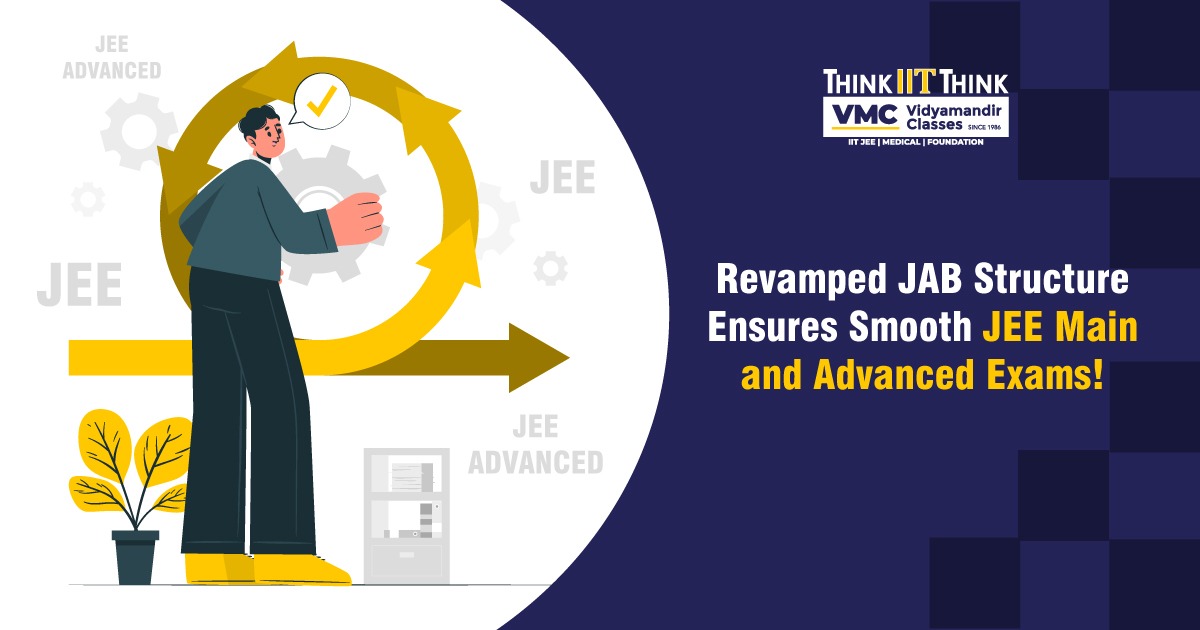Revamped JAB Structure Ensures Smooth JEE Main and Advanced Exams!
 Posted On
Posted On
213 total views, 1 views today
In a significant development in the realm of higher education in India, the Ministry of Education has recently unveiled a notification, heralding the reconstitution of the Joint Entrance Examination (JEE) Apex Board (JAB). This reshaping of the board’s structure and administrative framework aims to bring about a more streamlined and efficient approach to conducting the JEE Main and JEE Advanced exams – critical gateways for admission to undergraduate engineering programs in prestigious institutions such as the IITs, NITs, and other Centrally Funded Technical Institutions (CFTIs).

The transformation encompasses several key changes and strategic partnerships to ensure the seamless administration of these highly competitive and crucial examinations. The National Testing Agency (NTA) will take on a more prominent role, managing technology-related aspects, specifically software support. Additionally, for various back-end activities, including the online submission of application forms, the agency may collaborate with the Centre for Development of Advanced Computing (C-DAC) as needed. These structural adjustments are instrumental in guaranteeing the integrity and efficiency of the examination processes for the years 2024 and 2025 and beyond.
In this blog post, we will delve deeper into the reconstitution of the JAB, examining its implications, the key players involved, and the broader changes aimed at enhancing the educational landscape in India.
The JAB’s Renewed Role
At the heart of this reconstitution lies the JEE Apex Board (JAB), which will now be the ultimate authority in shaping policies, rules, and regulations for the administration of the JEE Main exam. This strategic move empowers the board to make informed decisions that will have a far-reaching impact on the future of aspiring engineering students. Furthermore, the JAB will play a pivotal role in coordinating with the institution responsible for organizing the JEE Advanced examination, ensuring a smooth transition from one examination to the other.
NTA’s Enhanced Administrative Support
The National Testing Agency (NTA) will assume an expanded role, providing administrative and logistic support for the JEE Main examination, which is conducted across the length and breadth of the country. This change is expected to bring a higher degree of standardization and efficiency to the examination process, making it more accessible to aspiring students from diverse backgrounds. As a result, the NTA’s involvement in JEE Main will be instrumental in the successful administration of the exam.
Continuity in JEE Advanced
The Indian Institutes of Technology (IITs) have consistently maintained their commitment to the JEE Advanced examination, and this continuity remains intact. The JAB of the IIT system will continue to oversee the organization and execution of the JEE Advanced exam. This consistency is vital in ensuring the high standards and rigorous evaluation that the JEE Advanced is renowned for.
Support from NIC/C-DAC
For all information technology-related (software) support and various back-end activities associated with the pre and post-examination work, including the online submission of application forms, the National Informatics Centre (NIC) and the Centre for Development of Advanced Computing (C-DAC) will play a crucial role. This partnership signifies a harmonious blend of expertise from various sectors to create a seamless examination process, leveraging technology for the benefit of both administrators and test-takers.
Embracing Transparency
One of the central tenets of this transformation is the embrace of transparency throughout the JEE Main and JEE Advanced processes. By adopting the transparency processes established by the IT system in these examinations, stakeholders can have greater confidence in the fairness and equity of the evaluation process. Transparency also extends to the policies, rules, and regulations that guide these examinations, assuring all participants of a level playing field.
What Does This Mean for Aspiring Engineers?
The reconstitution of the JEE Apex Board and its associated administrative changes have far-reaching implications for the countless young minds aspiring to pursue engineering in India. Here are a few potential advantages:
- Greater Efficiency: The revamped structure aims to streamline administrative processes, making it easier for students to apply and sit for the examinations.
- Enhanced Access: By providing administrative support, the NTA seeks to extend the reach of JEE Main, ensuring that students from diverse geographical and socioeconomic backgrounds can participate.
- Improved Governance: With the JAB taking on a more prominent role in setting policies and regulations, there’s a greater likelihood of decisions that benefit students’ interests and education as a whole.
- Transparency: The commitment to transparency in all aspects of the examination process reassures both students and their parents, reducing anxiety and uncertainty.
- Continuity in Excellence: The continued oversight of the JEE Advanced by the IIT system guarantees the maintenance of rigorous evaluation standards, which have been the hallmark of this prestigious examination.
The Bigger Picture: Transforming Education in India
Beyond the specific changes to the JEE Main and Advanced examinations, this reconstitution reflects a broader transformation in India’s educational landscape. It underscores the commitment of the Ministry of Education and relevant institutions to adapt and evolve with the times, addressing the challenges and demands of the 21st century.
The infusion of technology, expertise, and transparency not only benefits students but also raises the standard of education in the country. It sends a strong message that education is a top priority for the government, and ensuring its accessibility and fairness is non-negotiable.
Final Thoughts
The reconstitution of the JAB, with its emphasis on transparency, accessibility, and excellence, marks a significant step forward in the field of higher education in India. Aspiring engineers and their families can now look forward to a more streamlined and efficient examination process, thanks to the collaborative efforts of various institutions and organizations. This development is not just about JEE; it represents a commitment to nurturing and empowering India’s future through accessible and world-class education. It is a shining example of how education is a vital cornerstone for any nation’s growth and development.


